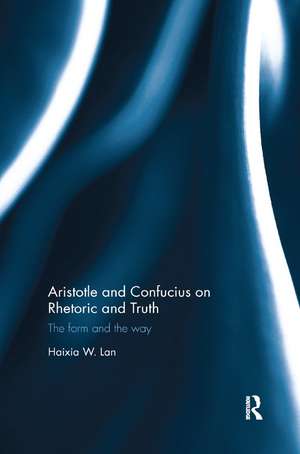Aristotle and Confucius on Rhetoric and Truth: The Form and the Way
Autor Haixia Lanen Limba Engleză Paperback – 12 dec 2019
| Toate formatele și edițiile | Preț | Express |
|---|---|---|
| Paperback (1) | 259.72 lei 6-8 săpt. | |
| Taylor & Francis – 12 dec 2019 | 259.72 lei 6-8 săpt. | |
| Hardback (1) | 875.55 lei 6-8 săpt. | |
| Taylor & Francis – 17 noi 2016 | 875.55 lei 6-8 săpt. |
Preț: 259.72 lei
Preț vechi: 326.36 lei
-20% Nou
Puncte Express: 390
Preț estimativ în valută:
49.70€ • 52.26$ • 41.06£
49.70€ • 52.26$ • 41.06£
Carte tipărită la comandă
Livrare economică 16-30 aprilie
Preluare comenzi: 021 569.72.76
Specificații
ISBN-13: 9780367884789
ISBN-10: 036788478X
Pagini: 238
Dimensiuni: 156 x 234 mm
Greutate: 0.44 kg
Ediția:1
Editura: Taylor & Francis
Colecția Routledge
Locul publicării:Oxford, United Kingdom
ISBN-10: 036788478X
Pagini: 238
Dimensiuni: 156 x 234 mm
Greutate: 0.44 kg
Ediția:1
Editura: Taylor & Francis
Colecția Routledge
Locul publicării:Oxford, United Kingdom
Public țintă
PostgraduateCuprins
Introduction: Living the Form and Knowing the Way
Chapter One: Aristotle and Rhetorical Invention: A Legacy of Probable Inquiry
Chapter Two: Interpreting the Analects: The Need to Address Rhetorical Invention
Chapter Three: Rhetorical Probability: Form, Eikos, Tianming, and Rendao
- Similarities and Differences
- Rhetoric and the Other
- Rhetoric and Truth
- Rhetoric and Sophistry
- A Twofold Argument
- Translations of Works by Aristotle and Confucius
Chapter One: Aristotle and Rhetorical Invention: A Legacy of Probable Inquiry
- Episteme and Techne
- Sophistical Reasoning
- Dialectical Reasoning
- Both Sophistical and Dialectical Reasoning
- Classical Rhetoric
- Rhetorical Invention Today
- Conclusions
Chapter Two: Interpreting the Analects: The Need to Address Rhetorical Invention
- Confucius and Rhetoric
- Confucius as a Rhetorician
- Confucius on Rhetorical Invention
- Studies of Confucius’ Analects
- Religious and Philosophical Interpretations
- Literary Interpretations
- Rhetorical Interpretations
- Two Approaches
- Difficulties with Focusing Exclusively on Differences
- Importance of Studying Differences within Cultures
- Conclusions
Chapter Three: Rhetorical Probability: Form, Eikos, Tianming, and Rendao
- Form and Eikos in Aristotle:
- Truth, Form, and Logos
- Form, Logos, and Nous
- Form, Logos and Pa
Notă biografică
Haixia W. Lan received her PhD in English from Purdue University with an emphasis on Rhetoric and Composition and Literary Theory. She works at the University of Wisconsin-La Crosse, teaching writing as a process of learning; theories of rhetorical invention; the grammar, politics, ethics of style; and comparative rhetoric. Her research is in all of these areas, and she is the academic director of 2+2 English degree program.
Recenzii
"Without any doubt [Lan] manages to put the two great thinkers, Greek and Chinese, on one platform where a comparison is possible ... the value of this work is this very approach. We must try to find ways of communication even across such difficult gulfs. Lan manages to bridge these very different worlds."
- Matylda Amat Obryk, Heinrich-Heine-University, Germany, Bryn Mawr Classical Review 2017
- Matylda Amat Obryk, Heinrich-Heine-University, Germany, Bryn Mawr Classical Review 2017
Descriere
Readings of Aristotle’s and Confucius’ teachings reveal that both philosophers’ rhetorical thinking contain vital similarities which can help us understand cultural differences today. Much has been said about Aristotle’s definition of rhetoric as ‘the faculty of observing in any given case the available means of persuasion’ but few studies have
